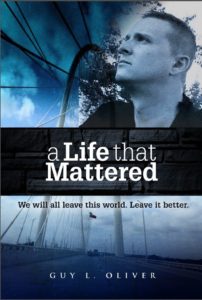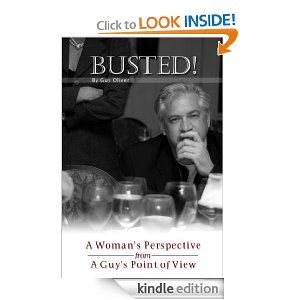Tim expressed love to others by giving. He was quick to share both his possessions and his time and, in a group setting, typically thought of himself last. That particular reality makes this part of his story perhaps the most difficult to tell.
 I have become at ease with the once dreaded words “He passed.” I can now talk without losing my composure about the circumstance of his death and the circumstance when I received the news of his demise. I can now drive by the scene of his accident without grieving. All of those things are part of his story and they are the things on which I once focused in the aftermath of his passing, but they no longer torment me as they once did.
I have become at ease with the once dreaded words “He passed.” I can now talk without losing my composure about the circumstance of his death and the circumstance when I received the news of his demise. I can now drive by the scene of his accident without grieving. All of those things are part of his story and they are the things on which I once focused in the aftermath of his passing, but they no longer torment me as they once did.
A much greater challenge for me today, is recalling what happened as the quiet period drew to a close. It began with what seemed like typical teenage rebellion, which I tried to dismiss as a phase brought on by the onset of male hormones—a boy growing into a man.
The sudden, massive increase in testosterone is inevitable and teenage rebellion is a necessary part of becoming a well-adjusted adult; I knew it then and I anticipated it.
I once took my family to Disney World. My brother-in-law at the time had a time-share on property, and I flew my family to meet his family there. It was the Christmas Season and the 25th anniversary of Disney World. Entrenched in my naïveté, I assumed this trip would be a positive, memory building affair. A plane trip to Disney World during two park-wide celebrations while staying on property with his cousins all of whom were old enough to have the run of the park seemed like a dream vacation for a teenager. Much of it was, but it was also the first time I saw an example of what was coming: the impending onslaught of Tim’s destiny.
It began when I noticed that Tim spent much of his stay at the timeshare rather than with the rest of us, a fact insignificant without context, but then I began to notice the complaining. In typical teenage fashion, he had developed a recent affinity for his friends that trumped family; we, all of us, were beginning to get in the way. At first I was merely put out, but something began to gnaw at me. That sense that I had lost him in that moment when he was eight, returned and began to settle in. It was that familiar feeling that something was desperately wrong and I again desperately wanted not to be right.
As I wrote that last statement I had the sense that it sounds alarmist. The world couldn’t possibly be ending simply because a teenager was complaining about what he didn’t have while sitting in the lap of luxury. Such a thing is hardly rare in this country. “They’re teenagers.” we say. “This is just the angst and rebellion that all too often accompanies adolescence.” and it was—but I sensed something else, something more. Something difficult to articulate.
When we checked out, I got my share of the bill for our stay and I realized Tim ran up about two hundred dollars in long distance calls to his friends. I was, of course, furious—but it wasn’t the money that bothered me. Nor would it bother any parent that unplanned money was spent accommodating a child’s desire to be in touch with his friends while on a luxury vacation.
For many parents it would be the ungratefulness for a wonderful gift. Perhaps that friends clearly had a higher priority than family. Maybe that the absence of your child from family was underscored by the phone calls and represented unrealized memories that will be forever lost.
It was all of that for me, but there was also present some notion, seemingly ethereal in its origin, that nagged at me. Much like a belief in God, many people dismiss the possibility that there is more to life than what we see and hear, while others know with certainty this can’t be all there is.
That was my sense: this can’t be all there is.
The thing about such notions is that they are often not addressable, especially with children, and we therefore left the resort without discussing it other than the initial mild scolding.
And it continued to eat at me.
On the evening of our arrival home it was Christmas Eve. Everyone was exhausted, the house was a wreck, having left it hurriedly as we tried to hustle three children to the airport, and the last thing anyone wanted was to prep for Christmas morning. Unwisely, I tried to insist. What happened next was what always happened, it seemed. My wife and I engaged in a very wicked and unseemly confrontation everyone hated.
After a drive to cool off, I came home and tried to pretend that everything was OK, but it wasn’t. A year later after much failed counseling, I filed for divorce within a week of our 20th anniversary. And the cracks began to show.
The environment that had been held together for 20 years with Elmer’s Glue, penny nails, and duct tape, was transformed from a fragile, creaking structure to a collapsing heap of what had once been a family with my children trapped inside.
I wrote early in this book that, in the event of the untimely loss of a loved one, self-reflection ceases to be a luxury. It becomes reflex rather than voluntary, and we are forced to examine our role in such an event. With firm conviction I believe choosing to divorce my wife was my contribution to the inevitable outcome, and I carry it with me every day.
With no full-time father in the home and my financial contribution diminished, my former wife felt the need to take a higher paying job that required out of town trips, and Tim was suddenly unfettered from rules. That thing I sensed, the boiling cauldron largely unperceived heretofore, began to erupt beginning with the fact that his best friend had access to illegal drugs, something I knew but chose to overlook.
I found marijuana hidden in the attic while gathering Christmas tree decorations the week we left for Disney World and other than scolding him and disposing of it, I ignored it. I could have tried to stop him from seeing his friend but instinctively, I knew such an action was folly, and this was Tim’s contribution to the final outcome. He began making decisions that, for young teens, all too often lead to worse decisions. It is not the drug so much as the immaturity of the mind and spirit that lead to other decisions, resulting in what can become a terrifying cascade of consequences they cannot imagine.
In the politically charged debate over illicit drug prohibition, marijuana is often positioned as something called a gateway drug that leads to more harmful, addictive drugs. I hold no position on the matter, except to say that in my son’s case it was so. I do not, however, blame the drug. I blame the fact that my son was a 14 year-old boy who had access to something no child should ever have access to. Vices have no place in the hands of children.
Because of my choice to divorce my wife and my inaction a year prior, I made a way for my son to make the bad decisions that ultimately ended tragically. That is the burden that I carry, and there is no real lesson to be learned, no advice I have to give, only the acknowledgement that this is the nature of Life.
“I wear the chain I forged in life. I made it link by link, yard by yard, and wore it of my own free will.”
– Marley, A Christmas Carol
Like Marley, I carry the chain comprising links that are the result of every action I have taken throughout my life, so did my son, and so do we all. We can’t unburden ourselves of the past whether good or bad and the most we can hope for is that there is more good than bad. I believe that for most of us the good is overwhelmingly greater than the bad, but whatever the composition of the chain, we owe it to ourselves and those we love to acknowledge it.
Six months after my divorce, the quiet period ended.
It was my weekend with the kids. Their mother was out of town and Tim hatched a scheme to skip out on the weekend with dad to have, instead, a party at his mother’s house. He concocted an elaborate story that included a sleepover and a trip to Sea World with a friend.
I drove to my ex-wife’s house to retrieve my daughters and left Tim there for his friend’s parents to pick him up, taking him at his word. On our way home, Ashley informed me that she had forgotten something and I turned the car around.
When we arrived, there were several cars in the driveway, which seemed unusual, but I immediately dismissed the idea that anything was wrong. When Ashley entered the house, something startled her and she screamed. I waited five minutes and then called the police. I wasn’t alarmed but my ex-wife had made it clear that I was not to set foot on her property and I just needed to better understand what I was dealing with.
After the police arrived, teenagers began pouring out of the house and it became immediately clear exactly what was going on inside. With no supervision at his mother’s house, the police insisted that Tim go home with me.
The trip home was filled with nothing but anger because I had ruined his plans. For the first time, I saw the defiance in full bloom. The cauldron spilled over and we were all witness to it and through all of it, in an uncharacteristic move, I kept my mouth shut and let him vent, believing it would pass.
This part I recall with crystal clarity. At the top of his lungs, mid-rant, my son yelled
“You’re not my father anymore.”
I replied
“That’s OK; you’re still my son.”
Ultimately, afraid he would leave my apartment in the middle of the night, I drove him home. I recall saying I love you, although that may be fantasy. In either case, he remained silent. He simply left.
As a parent, what am I to say about this turn of events? Someone is right? Someone is wrong? These subjective judgements lose their meaning in a situation such as this. That was the moment Tim picked up his chain and began forging links all of us, himself included, would regret.
He had crossed some threshold; driven through some barrier; crossed into some uncharted territory beyond my reach.
In such circumstances mistakes and blame also lose their meaning. I made choices. My wife made choices. My son made choices. And in the end, we are all left only with the option of either owning those choices or refusing to acknowledge them.
The quiet period ended and the storm, that lay dormant within my son until that moment, awakened with a vengeance.


